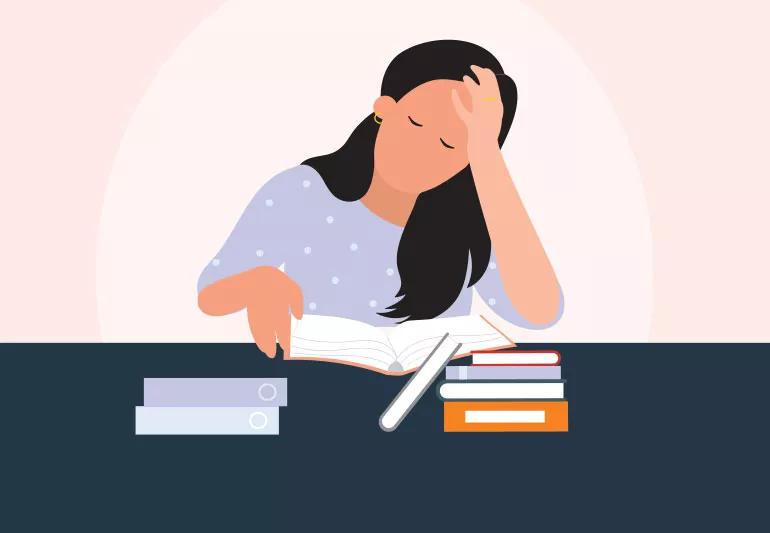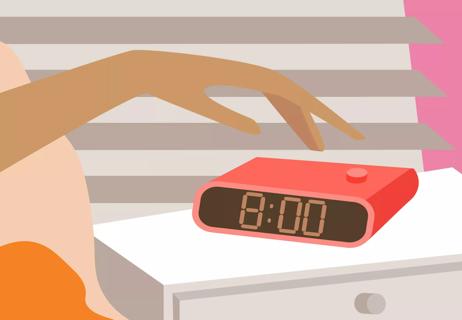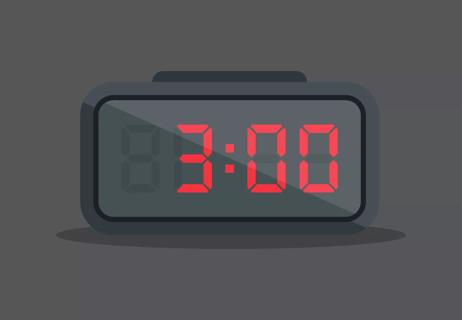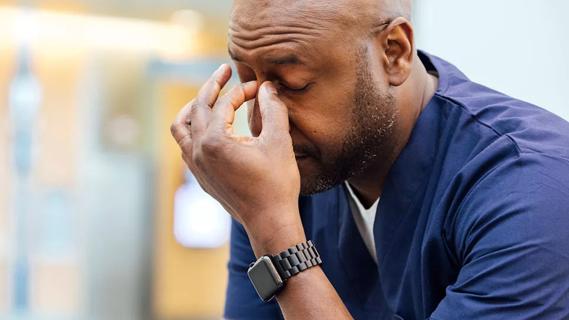Sleep disorders, diet and mental health can affect the quality of your sleep

Whether the advice came from your healthcare provider or your parents, the golden rule for feeling well-rested has generally been the same: Be sure you’re getting enough sleep.
Advertisement
Cleveland Clinic is a non-profit academic medical center. Advertising on our site helps support our mission. We do not endorse non-Cleveland Clinic products or services. Policy
And sure, we’ve all had those nights where we’ve stayed up too late and noticed the effects of it the day after. But what if you’re getting the right amount of sleep, but still feel tired? It can be a frustrating feeling.
But in reality, the quality of sleep we’re getting is just as important as the quantity.
Sleep disorders specialist Marri Horvat, MD, explains why you might not be getting high-quality sleep.
Dr. Horvat says that often, when you still wake up tired, even after you’ve gotten enough sleep, it may be due to one of these reasons:
If you’re feeling foggy and tired during the day, it could be a sign of an underlying sleep disorder. For example, sleep apnea — a disorder that causes you to stop breathing temporarily while asleep — is known for causing people to regularly feel exhausted.
Another sleep disorder, restless legs syndrome (RLS), leads to feelings of fogginess and can even cause insomnia.
Other sleep disorders that can bring on tiredness during the day include:
In some cases, your daytime fatigue could be a sign of a thyroid problem. Specifically, tiredness during the day is a common symptom of an underactive thyroid. This is when your thyroid organ doesn’t make enough of the thyroid hormone, which in turn, slows down your metabolism and can lead to constant fatigue.
Advertisement
Your environment could also be sabotaging your sleep without you realizing it. If you’re constantly jolting awake due to a car alarm going off outside or tossing and turning because your room is too hot, this can affect your overall sleep quality.
“We need to have the proper environment to ensure we can get enough sleep and are not waking up due to environmental factors,” says Dr. Horvat. “Everyone’s a little different, but it really comes down to comfort.”
Eating a big meal before bed can impact your sleep, but alcohol is also very disruptive to your sleep. In fact, Dr. Horvat points out that drinking alcohol within four hours of sleep can lead to poor quality of sleep throughout the night.
“While alcohol may feel like it is helping you fall asleep, it actually leads to fragmentation of your sleep and changes your sleep stages,” she explains. “This leads to a poor quality of sleep overall and typically people don’t feel well rested in the morning.”
If you’ve ruled out sleep disorders or any other sleep-related issues, you may want to talk to a healthcare provider to see if there’s a connection to stress or an underlying mental illness.
Conditions like anxiety or depression can play a part in making you feel tired during the day, even when you get enough hours of sleep. In addition, mood disorders like bipolar disorder or premenstrual dysphoric disorder can cause feelings of sluggishness during the day.
“In fact, one of the most common reasons people wake up early in the morning and can’t go back to sleep is due to mood issues like depression,” notes Dr. Horvat.
Constant feelings of exhaustion may also be a sign of anemia in some cases. Even if you get a full eight hours of sleep, having an iron deficiency can lead to feeling low in energy, if left untreated. But feeling fatigued wouldn’t be the only sign either.
Some other common symptoms include:
If you’re not sure if you have anemia, talk to a healthcare provider about any other accompanying symptoms you may be having.
Sleep affects your health in profound ways — from creating memory issues to affecting your immune system. So, it’s crucial to ensure you’re getting the right quantity and quality of sleep.
“Typically, we recommend seven to nine hours of sleep a night. However, everyone is a bit different. It really depends on how much sleep you need to feel well-rested,” says Dr. Horvat.
The number of hours of sleep also varies based on your age. If you’re over the age of 13, you should be aiming for around eight hours of sleep every night. This gives enough time for your body to recover from the day and feel refreshed for the next one. Some of us might feel well-rested with less. Some of us will need more.
Advertisement
And yes, we all have our all-nighters (whether it’s because you’re partying with friends or lulling your little one to sleep). But it’s important for this not to become your daily norm. And even if you swear you’re fine with under seven hours a night, your body may be sending you a different message.
“It’s also important to distinguish between how much sleep you need to function vs. how much you need to feel well rested,” clarifies Dr. Horvat. “Often, I hear people say, ‘I only need six hours a night to function,’ but those same people admit to not feeling well with only that amount of sleep, which indicates they needmore sleep.”
But what if you’re sleeping more than eight hours a night? In some cases, this may be needed if you’re getting over an illness or catching up on some lost ZZZs. But there are signs to look out for that may point to a sleep disorder or larger issue.
“If someone is sleeping 10 or more hours a day and feeling well rested without the need for naps etc., they may just be a long sleeper,” says Dr. Horvat. “However, if they aren’t feeling refreshed in the a.m., feeling sleepy during the day, or even sometimes feeling worse after a nap, this could be indicative of a sleep problem.”
Advertisement
Usually, it’s best to speak to a sleep specialist if you’re sleeping 10+ hours a day and still not feeling refreshed.
In addition to making sure you get seven to nine hours each night, there are ways toimprove thequality of your sleep, including:
Advertisement
Dr. Horvat recommends seeing a sleep disorder specialist if you’re still feeling extreme symptoms of fatigue and tiredness during the day, even after getting seven to nine hours of sleep each night. If you feel like certain lifestyle changes aren’t cutting it, they can help you get checked for a sleep disorder.
Sleep is a key ingredient to a healthy lifestyle, so if your body is telling you that something is off, it’s important to listen to your body — and speak with a healthcare provider.
Learn more about our editorial process.
Advertisement

It’s normal to oversleep occasionally, but sometimes, there might be an underlying cause

This common phenomenon is usually harmless, but a consistent sleep-wake schedule can help

Tips for readjusting your sleep cycle

Connecting with others, going for a walk or focusing on sleep quality can help more than you might realize

The answer is yes — but there are things you can do to help boost your energy

Like being your own best friend in times of trouble, self-love is an act of self-preservation

It’s not about embracing your dark side — it’s about showing up for yourself

Many factors, like dehydration, a cold or even your medication, can result in these common symptoms

Type 2 diabetes isn’t inevitable with these dietary changes

Applying a hot or cold compress can help with pain